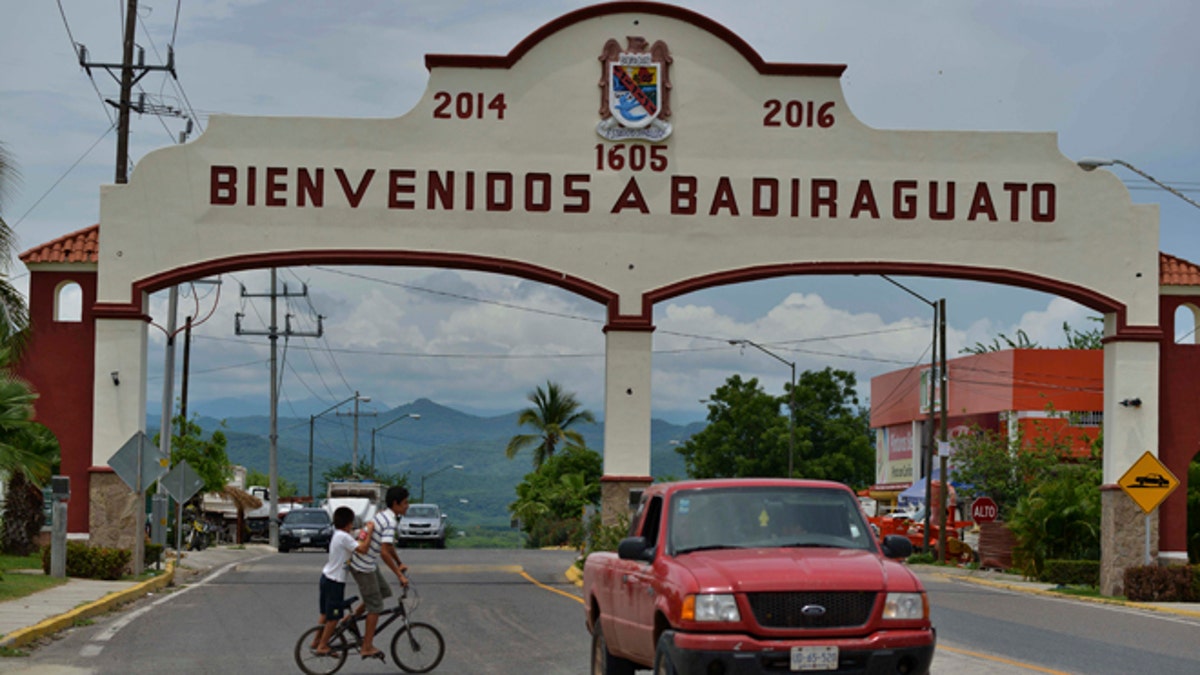
In this July 20, 2015 photo, a car drives past the entrance to the town of Badiraguato, Mexico.
Mexico City, Mexico – One month after his spectacular escape from a maximum-security prison, authorities in Mexico appear to have made little progress in tracking down the country's most notorious drug lord, Joaquín “El Chapo” Guzmán. And with every day that he remains at large, his already larger-than-life reputation as an apparently omnipotent crime lord that no prison can hold grows.
Mexicans themselves meanwhile, seem only too glad to help him acquire mythical status.
All over the country, piñata-makers have put freshly made Chapo piñatas on display. In Culiacán, the northern capital of Chapo's home state of Sinaloa, t-shirts and caps depicting the drug lord fill the shelves of market stands.
It took less than a full day after Chapo escaped for the first “narcocorridos” – narrative songs celebrating the cartel life – describing his prison break to begin circulating on the Internet, their lyrics expressing a mixture of morbid fascination with the Sinaloa Cartel chief’s exploits and a total disdain for the federal government that allowed him to escape.
In Badiraguato, the municipality where Chapo was born, the mood at the time of his July 11 escape was festive locals say.
- Portrait of Mexican town that produced the world’s most notorious drug lord
- The pictures of El Chapo’s cinematographic escape
- ‘No more narco-elections!’ Mexico elections marred by violence and turf battles
- How Chapo Guzmán broke out of Mexico’s highest-security federal prison
- Mexico’s narco-mausoleums make being dead look pretty swanky
“The reaction among people in Sinaloa was one of gusto,” Omar Meza, a resident and the composer of a song inspired by Chapo's previous daring escape from a federal prison in 2001, told FNL. “He's very popular here.”
The place is a traditional stronghold of Mexico's illicit drug trade, and its dozens of tiny hamlets are tucked against the side of the rugged Sierra Madre.
Many of them – such as Chapo's birthplace, La Tuna – are only connected to the outside world by dirt roads, while the surrounding mountains are riddled with opium and marijuana plantations.
In theory it is one of the poorest municipalities in the country, but its seat, the town of Badiguarato, has neatly paved streets, freshly painted buildings and far more thriving small businesses than a town of such poverty should reasonably have.
Locals say the Sinaloa Cartel, the organization led by Chapo and his associates, controls the labor market here and has strong popular support, thanks in part to the protection its heavily armed gunmen provide to communities.
Part of the lore about the drug lord is the cartel is said to have invested a lot of money into the local infrastructure and even done charity work, supposedly.
“One of the reasons why Chapo is so popular and celebrated in Sinaloa is because he is seen as an alternative to the government,” one former military intelligence officer who was stationed in Sinaloa in the 1980s and 1990s and who requested anonymity out of safety concerns, told FNL. “The cartel’s power is based on violence and fear, but at the same time it provides security to communities in the mountains, something which the government has never been able or willing to do.”
A young woman from a hamlet located near La Tuna told FNL, “Most people in the mountains would think twice to speak ill of Chapo. The law of the land is enforced through the barrel of a gun, and the cartel doesn't like criticism.” She too asked to remain anonymous out of fear of reprisal – her husband was a marijuana farmer who was murdered by a cartel gunman.
One of her uncles, she said, even gave Chapo shelter after his 2001 escape from the Puente Grande prison in the state of Jalisco. “He helped [Chapo] because he knew him, but also because you're not going to refuse one of the most powerful drug lords in the world,” she said.
Chapo's myth extends well beyond the state borders of Sinaloa, however, and critics say the Mexican government is mostly at fault for that.
“The whole of Mexico now looks at him as a kind of antihero”, says José Reveles, a veteran investigative reporter and the author of a number of books on the Mexican drug war, including one on the 2014 arrest of Chapo. “A kind of avenger – someone who vindicates a society that’s weary of an incompetent and untrustworthy government. It's not just that Chapo was smart enough to escape, but that the government was foolish enough to claim that he wouldn't.”
According to Reveles, the Mexican government itself has participated actively in helping to create the myth of Chapo.
“How many times did government officials say they were so close to capturing him, only to have missed him at the very last moment? They made him look smart,” Reveles told FNL. “And even though Chapo is a very violent man, the authorities needed him to seem less violent as a way to justify going after more disruptive groups such as Los Zetas.”
Like us on Facebook
